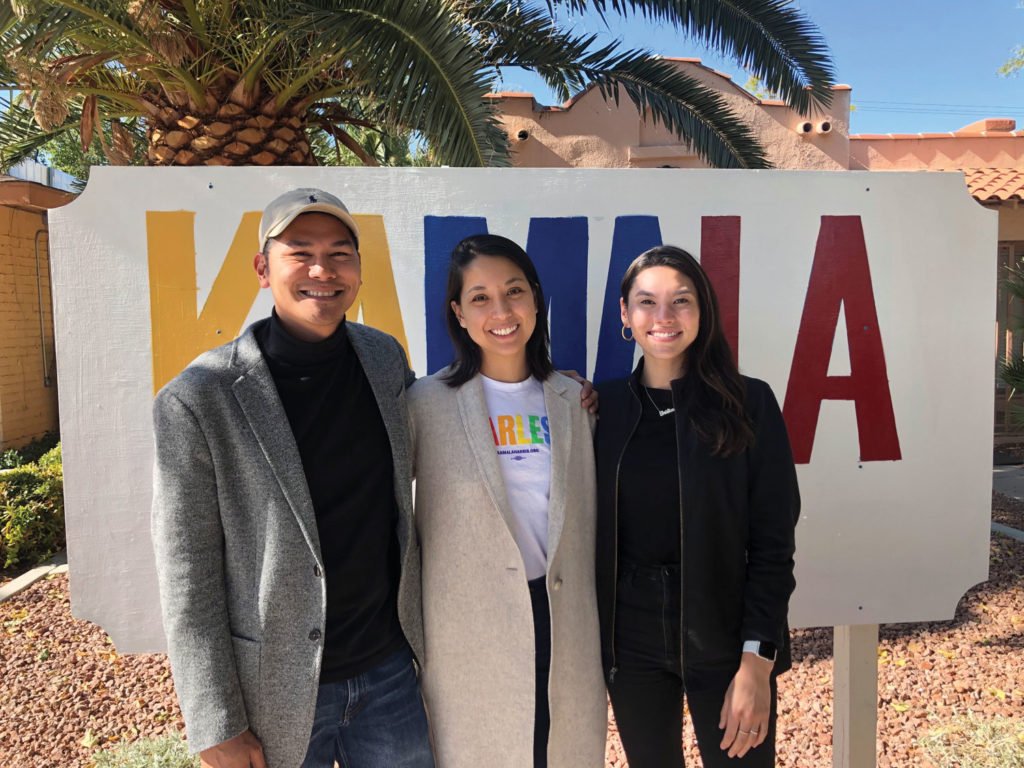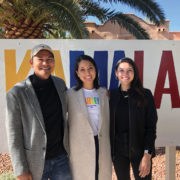
California Sen. Kamala Harris is running for the Democratic nomination to restore justice and prosecute the case against four more years of Donald Trump. She is also running one of the most diverse campaigns for president, with Asian & Pacific Islander Americans at the top levels of the campaign nationally and in Nevada.
Harris, an APIA woman herself, has hired Christiana Ho to lead the state’s organizing operations, Natalie Tham to head up Nevada’s data and analytics department, and, until very recently, Gabe Uy to run the political operation. Uy, a member of the Nevada Army National Guard, was unexpectedly called up to active duty and had to leave the campaign to fulfill his military service.
All three have been involved with campaigns for a while, and most have previous experience organizing in Nevada and the APIA community. Uy is a native Las Vegan and an alumnus of the University of Nevada, Reno. Tham and Ho are from Maryland and Illinois respectively, but are not new to campaigns. They both are veteran campaigners, and Ho organized in Nevada in 2016.
Uy got his start in politics from a very young age thanks to his mom’s political involvement. “My mom was a member of SEIU 1107 and always brought me with her when she voted,” he said.
For Tham, it was a different approach. She graduated from the University of Maryland as an engineer and did not go directly into politics. For her, it was the 2016 election that changed her plans. She started out as a data volunteer in the 2017 Virginia gubernatorial election, where she found her love of campaigning. “Through that opportunity, I was connected to a broad network of people willing to guide me through the world of political data,” said Tham.
For Ho, getting into politics happened thanks to the APIA community and her network who brought her into the field. “A mentor of mine told me about an internship opportunity with the political team on the Hillary Clinton Campaign in 2015,” said Ho. “At the time, I had never considered going into politics, but applied and was able to intern for Lisa Changadeveja, who was the director of Asian-American outreach. Lisa was the one who told me that if I wanted to learn more about campaigns and really have an impact, then I needed to be an organizer in Nevada. That’s exactly what I did and it completely changed my life.”
The importance of representation and APIAs in political campaigns
Political campaigning can seem like a difficult field in which to get started. Having a good professional network and being able to leverage your relationships is key to getting one’s foot in the door. That’s exactly why politics can also be a field that lacks diversity and representation. This means it’s even more important for campaigns to make a conscious decision to hire diverse talent and empower minority voices.
Harris’ campaign is frequently named one of the most diverse campaigns, and her U.S. Senate office was recently recognized for the same achievement. In Nevada, Harris has elevated APIA voices to the top levels of her operation — something that’s not lost on her APIA staffers.
“I cannot emphasize enough how important it is to have APIA representation in politics,” said Ho. “Representation shows you anything is possible. It’s ultimately how I got my start in politics and why it’s so exciting to work for Kamala Harris.”
For Tham, APIA representation is about having people who can uniquely speak to the lived experiences of the APIA community. “Representation matters, lived experiences matter, and it’s important for young members of the APIA community to be able to see themselves in their elected officials. Every community is faced with its own unique set of challenges, and the APIA community is no exception,” she said.
For Uy, it’s more than just having APIAs in campaigns. For him, representation extends to every level of government. According to Uy, “APIA representation in politics is so important because our community is disproportionately represented, and our voices and perspectives need to be a factor in decision-making. APIAs have a long history in this country and we have a duty to be a part of the direction it takes.”
“You’ve seen Senators Kamala Harris and Mazie Hirono take on Brett Kavanaugh and William Barr,” Uy continued. “And Rep. Pramila Jayapal standing up for transgender people. And Rep. Ted Lieu advocating for our military and national security. And here in Nevada, Assemblywoman Rochelle Nguyen and former Henderson City Councilwoman Gerri Schroder improving the lives of Nevadans, alongside labor leader Grace Vergara-Mactal and community leader Vida Lin among so many others”
When Kamala Harris announced she was running for president, all three APIA staffers knew she was their candidate and would do anything to work for her. As not just a woman of color, but one of the few APIA candidates in the field running for president, Kamala’s candidacy inspired Uy, Ho, and Tham to get involved once again.
“Kamala is a fighter and champion for people, and in addition to being APIA herself, she has a long history of working in and with the APIA community in the San Francisco Bay Area and across California,” said Uy.
For Tham, it was broader than that. “Kamala represents an American narrative that often gets left out,” Tham said. “Like me, she is a product of two unique cultures, two traditions, two histories. Because of this, she is able to see what unites us and understands that, regardless of your background or language, everyone deserves justice.”
“I feel lucky and proud to work for Kamala Harris,” said Ho. “With so much at stake, I could be working for a candidate simply because I think they’re the best person to take on Donald Trump. What’s exciting about Kamala Harris is that she is not only the best person to prosecute the case against Donald Trump, but she also has an incredible vision for America and the plans to get us there. Every single one of her policies is crafted with the framework of how it will impact a person’s life, but Kamala is also prepared to fight for these policies.”
For all three of them, who Kamala Harris is and what she represented were also factors in why they chose early on to work for her. While Tham and Ho identified with Harris’ bicultural background, Uy identified with Harris’ upbringing. “I was raised by a single parent mom, just like Kamala,” he said. “Her mom was a breast cancer researcher and my mom is a nurse. My mom emigrated to the United States on her own just like Kamala’s mom.”
“To work for someone like Kamala is not only a privilege, but also exciting because with every step of the way we are making history,” said Ho. “Kamala will be the first black woman, the first AAPI woman, and the first woman to become president of the United States. And because she’s the first, she won’t be the last.”
Advice to other APIAs
There’s no better time for APIAs to get involved in politics. The stakes could not be higher, and recent elections have demonstrated that communities of color have enormous electoral power when they turn out to vote. When asked what advice they would give to other young APIAs who want to get involved in politics, Uy, Tham, and Ho all had their own tips to share from their experiences.
Uy: “If you’re interested in getting involved in politics, come to our office at 618 S 7th Street in downtown Las Vegas and let’s elect Kamala Harris the first Asian American president in history.
Tham: “My advice for young APIA leaders is to never stop asking questions and talk to as many people as you can — most people love sharing their personal story, and you can learn so much from the experiences of others.
Ho: “My advice to AAPI leaders interested in getting involved in politics is to invest in your relationships not just in the progressive space where there are jobs but also with members of the communities you care about. And also be resilient.”






